April 5, 2019 •
Utah Campaign Finance Bills Signed
Last week, Gov. Gary Herbert signed six bills amending the state’s campaign finance laws. Updates include amended registration and reporting requirements for political action committees (PACs) and political issues committees (PICs). Additionally, updates modify provisions relating to the statement of […]
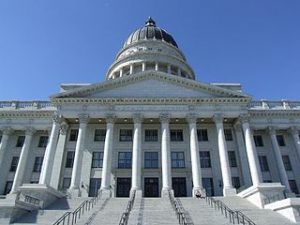 Last week, Gov. Gary Herbert signed six bills amending the state’s campaign finance laws.
Last week, Gov. Gary Herbert signed six bills amending the state’s campaign finance laws.
Updates include amended registration and reporting requirements for political action committees (PACs) and political issues committees (PICs).
Additionally, updates modify provisions relating to the statement of organization and naming requirements of a PAC.
Other changes include a provision banning PICs from contributing to PACs and clarifications on how to dissolve a PAC.
Regarding electioneering communications, House Bill 319 requires a person making an expenditure for certain advertisements relating to a ballot proposition to disclose the person’s identity in the advertisement.
All bills take effect on May 13, 2019.
March 29, 2019 •
South Dakota Governor Signs Campaign Finance Bills
Gov. Kristi Noem recently signed several campaign finance bills into law. House Bill 1189 provides any person who is subject to a Class 2 misdemeanor for campaign finance violations up to seven days to cure the violations prior to having […]
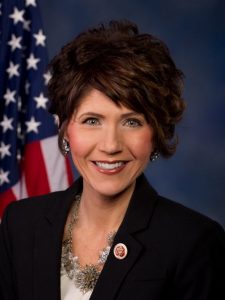 Gov. Kristi Noem recently signed several campaign finance bills into law.
Gov. Kristi Noem recently signed several campaign finance bills into law.
House Bill 1189 provides any person who is subject to a Class 2 misdemeanor for campaign finance violations up to seven days to cure the violations prior to having a charge brought against him or her.
House Bill 1092 clarifies reporting requirements for candidates.
House Bill 1143 states all political action committees established, financed, maintained, or controlled by the same person or entity are affiliated and share a single contribution limit both with respect to contributions made and contributions received.
Senate Bill 114 requires any contribution from a person who is an unemancipated minor to be deducted from the total contribution permitted by the unemancipated minor’s custodial parent or parents.
The bills become effective July 1.
March 28, 2019 •
West Virginia Governor Signs Campaign Contribution Bill
Gov. Jim Justice signed Senate Bill 622 on March 27, with an effective date of June 7. The bill increases campaign contribution limits allowing $2,800 to candidates, $5,000 to political action committees (PACs), and $10,000 to party committees. The current […]
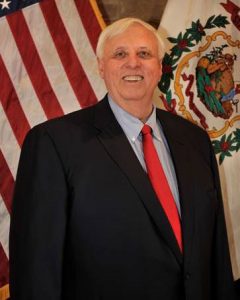 Gov. Jim Justice signed Senate Bill 622 on March 27, with an effective date of June 7.
Gov. Jim Justice signed Senate Bill 622 on March 27, with an effective date of June 7.
The bill increases campaign contribution limits allowing $2,800 to candidates, $5,000 to political action committees (PACs), and $10,000 to party committees. The current limits for each category are set at $1,000.
PACs will also be required to electronically file all independent expenditure reports and financial statements.
The bill also requires federal PACs who spend money on state elections to file disclosures with the Office of Secretary of the State.
Gov. Gary Herbert signed House Bill 320 this week, putting it into effect immediately. The bill expands the existing prohibition on contributions to legislators during a legislative session to also cover contributions to the lieutenant governor, attorney general, state auditor, […]
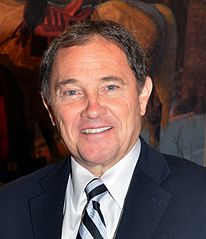 Gov. Gary Herbert signed House Bill 320 this week, putting it into effect immediately.
Gov. Gary Herbert signed House Bill 320 this week, putting it into effect immediately.
The bill expands the existing prohibition on contributions to legislators during a legislative session to also cover contributions to the lieutenant governor, attorney general, state auditor, and state treasurer.
The prohibition extends to contributions to the personal campaign committees and political action committees (PACs) of the covered candidates. Previously, only contributions to legislators were banned during sessions.
Parties prohibited from contributing during session include persons, lobbyists, principals, and political committees.
October 23, 2017 •
FEC Fines Federal Contractor for Contribution to Super PAC
Contributions by federal contractors to federal independent expenditure-only political action committees, also known as super PACs, may violate the federal pay-to-play prohibition. On September 25, 2017, the Federal Election Commission (FEC) entered into a Conciliation Agreement with a federal contractor […]
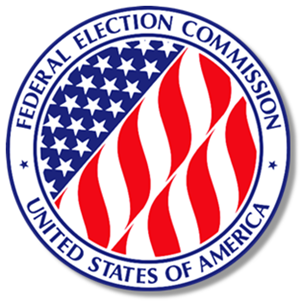 Contributions by federal contractors to federal independent expenditure-only political action committees, also known as super PACs, may violate the federal pay-to-play prohibition.
Contributions by federal contractors to federal independent expenditure-only political action committees, also known as super PACs, may violate the federal pay-to-play prohibition.
On September 25, 2017, the Federal Election Commission (FEC) entered into a Conciliation Agreement with a federal contractor after finding the contractor had violated pay-to-play prohibitions by making contributions to a federal independent expenditure-only political action committee.
The FEC fined the contractor, Suffolk Construction Company, $34,000 for making two $100,000 contributions in 2015 to Priorities USA Action, a super PAC supporting then presidential candidate Hillary Clinton. Because the matter was resolved by agreement between the FEC and the contractor, there was no challenge made to the FEC’s fine.
Following suggestions from a working group of the legislature, Sec. of State Lawerence Denney presented a series of ethics and campaign finance draft bills to improve the state’s public disclosure system. The suggested changes include limiting PACs from accepting more […]
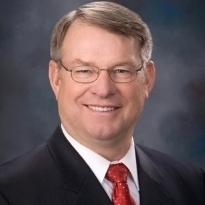 Following suggestions from a working group of the legislature, Sec. of State Lawerence Denney presented a series of ethics and campaign finance draft bills to improve the state’s public disclosure system.
Following suggestions from a working group of the legislature, Sec. of State Lawerence Denney presented a series of ethics and campaign finance draft bills to improve the state’s public disclosure system.
The suggested changes include limiting PACs from accepting more than $1,000 from other PACs unless the contributing PAC is registered with the state, removing an exception for local election reporting, increasing the frequency of campaign finance reporting, and requiring lobbyists to report all year, rather than only while the legislature is in session. Increasing fines for reporting violations is also on the table.
With ample funding available, the Sec. of State’s office would also like to see major improvements to the online reporting system. Critics are concerned increased reporting would be too burdensome and dissuade citizens from getting involved in the political process.
July 19, 2017 •
Missouri Ethics Commission Issues Advisory Opinion Regarding Corporate Contributions to PACs
The Missouri Ethics Commission recently issued an advisory opinion clarifying campaign finance rules for corporations seeking to contribute to PACs. Currently, a corporation may not contribute its own funds to its connected PAC, but it may contribute direct corporate funds […]
 The Missouri Ethics Commission recently issued an advisory opinion clarifying campaign finance rules for corporations seeking to contribute to PACs.
The Missouri Ethics Commission recently issued an advisory opinion clarifying campaign finance rules for corporations seeking to contribute to PACs.
Currently, a corporation may not contribute its own funds to its connected PAC, but it may contribute direct corporate funds to an unconnected PAC. The new opinion provides additional guidance on whether a corporation and a PAC are considered connected for the purpose of campaign finance law.
If contributions to a PAC are from a corporation’s general treasury, and not from the corporation’s officers, employees, or spouses thereof, it is possible the PAC is not connected to the organization. In such a scenario, if the corporation does not expend funds or provide services or facilities to administer or maintain the PAC, and it does not expend funds or provide services to solicit contributions to the PAC from its members, officers, directors, employees, or security holders, it is not a connected organization. This is true even when the PAC is funded 100 percent by a corporation’s general treasury funds.
Moreover, assuming the corporation did not establish the PAC and does not serve as a connected organization, it may make unlimited monetary contributions from the corporate treasury.
June 9, 2017 •
Wisconsin Legislator to Introduce Campaign Finance Package
Wisconsin State Sen. Chris Larson is introducing eight bills aimed at amending state campaign finance laws. The bills would restore lower contribution limits, amend the definition of political action committee, require transparency in political communications, limit coordinated campaign expenditures, expand […]
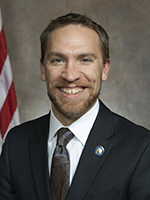 Wisconsin State Sen. Chris Larson is introducing eight bills aimed at amending state campaign finance laws.
Wisconsin State Sen. Chris Larson is introducing eight bills aimed at amending state campaign finance laws.
The bills would restore lower contribution limits, amend the definition of political action committee, require transparency in political communications, limit coordinated campaign expenditures, expand reporting requirements for committees receiving a contribution exceeding $100 from an individual, and prohibit corporations and labor unions from contributing to segregated funds established by political parties or legislative campaign committees.
Larson says the proposed changes reflect common sense and would not drastically overhaul the current campaign finance system.
Parts of a campaign finance law approved by Missouri voters in November have been ruled unconstitutional. U.S. District Court Senior Judge Ortrie Smith issued a ruling Friday finding corporations and labor organizations must be permitted to make contributions to campaign […]
 Parts of a campaign finance law approved by Missouri voters in November have been ruled unconstitutional.
Parts of a campaign finance law approved by Missouri voters in November have been ruled unconstitutional.
U.S. District Court Senior Judge Ortrie Smith issued a ruling Friday finding corporations and labor organizations must be permitted to make contributions to campaign committees only supporting or opposing ballot measures, and political action committees must be able to receive contributions from other political action committees.
The court also ruled the ban on contributions to PACs by heavily regulated entities unconstitutional.
Finally, the ruling permanently enjoins the Missouri Ethics Commission from interpreting certain campaign finance provisions in any manner inconsistent with previously issued advisory opinions. Contribution limits will continue to apply only to contributions to candidates unless a contribution to a continuing committee or PAC is restricted or designated for a specific candidate.
The court stayed any injunctive relief ordered for 45 days to allow the state to review the ruling and to allow for an opportunity to appeal.
March 28, 2017 •
Kentucky’s Governor Signs Campaign Finance Bill
Gov. Matt Bevin approved changes to a campaign finance law yesterday, March 27, 2017. Senate Bill 75 doubles current contribution limits for individuals giving to candidates, state executive committees, and caucus campaign committees. The limit for individuals giving to PACs […]
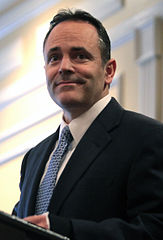 Gov. Matt Bevin approved changes to a campaign finance law yesterday, March 27, 2017.
Gov. Matt Bevin approved changes to a campaign finance law yesterday, March 27, 2017.
Senate Bill 75 doubles current contribution limits for individuals giving to candidates, state executive committees, and caucus campaign committees. The limit for individuals giving to PACs also increases from $1,500 to $2,000.
Contributions to candidates and PACs will be indexed for inflation every odd-numbered year based on the Consumer Price Index. The bill also creates a single reporting threshold of $3,000 for campaign finance reports.
The bill is effective June 28, 2017, or 90 days from adjournment sine die of the regular session of the Legislature.
March 28, 2017 •
West Virginia Campaign Finance Bill Passes Senate
On March 27, the West Virginia Senate voted to approve a bill to overhaul campaign finance laws. Senate Bill 539 will raise campaign contribution limits to allow individuals to donate up to $2,700 to candidates for statewide office per election […]
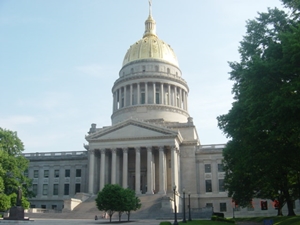 On March 27, the West Virginia Senate voted to approve a bill to overhaul campaign finance laws.
On March 27, the West Virginia Senate voted to approve a bill to overhaul campaign finance laws.
Senate Bill 539 will raise campaign contribution limits to allow individuals to donate up to $2,700 to candidates for statewide office per election cycle. Individuals would also be able to contribute up to $5,000 to PACs per year and $10,000 to state parties and caucus campaign committees per year.
The bill also proposes changes to disclosure requirements, allowing citizens to donate up to $1,000 to certain PACs that do not donate to individual candidates or their committees before the donor’s identity must be disclosed.
The bill now moves to the House for consideration.
March 15, 2017 •
Kentucky Lawmakers Pass Campaign Finance Bill
The Kentucky Legislature passed a bill this week to double the limits on contributions from individuals and PACs to candidates, state executive committees, and caucus campaign committees. Senate Bill 75, according to supporters, provides greater transparency and will make it […]
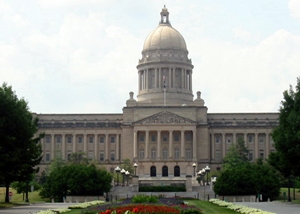 The Kentucky Legislature passed a bill this week to double the limits on contributions from individuals and PACs to candidates, state executive committees, and caucus campaign committees.
The Kentucky Legislature passed a bill this week to double the limits on contributions from individuals and PACs to candidates, state executive committees, and caucus campaign committees.
Senate Bill 75, according to supporters, provides greater transparency and will make it easier for everyday citizens to compete with dark money while running for office.
Opponents, however, believe the focus should be on curbing dark money and adding more money to the equation will further erode public trust.
Nonetheless, the bill will now be sent to the governor for review.
March 2, 2017 •
Going to the National PAC Conference? So are we!
We can’t wait to see everyone at the Public Affairs Council National PAC Conference. If you’ll be attending, come on by and say hello at our Resource Marketplace booth.
We can’t wait to see everyone at the Public Affairs Council National PAC Conference. If you’ll be attending, come on by and say hello at our Resource Marketplace booth.
February 28, 2017 •
Ohio Secretary of State Raises Campaign Contribution Limits
The Ohio Secretary of State Campaign Finance Division recently released revised contribution limits. The new limits are effective February 25, 2017, through February 24, 2019. Among the changes, the limit individuals, political action committees (PACs), and political contributing entities (PCEs) […]
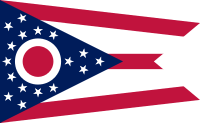 The Ohio Secretary of State Campaign Finance Division recently released revised contribution limits. The new limits are effective February 25, 2017, through February 24, 2019.
The Ohio Secretary of State Campaign Finance Division recently released revised contribution limits. The new limits are effective February 25, 2017, through February 24, 2019.
Among the changes, the limit individuals, political action committees (PACs), and political contributing entities (PCEs) may give to statewide or state legislative candidates increased from $12,532.34 per election period to $12,707.79 per election period.
The secretary of state adjusts statutory contribution limits in each odd-numbered year based on the Consumer Price Index.
State and Federal Communications, Inc. provides research and consulting services for government relations professionals on lobbying laws, procurement lobbying laws, political contribution laws in the United States and Canada. Learn more by visiting stateandfed.com.


